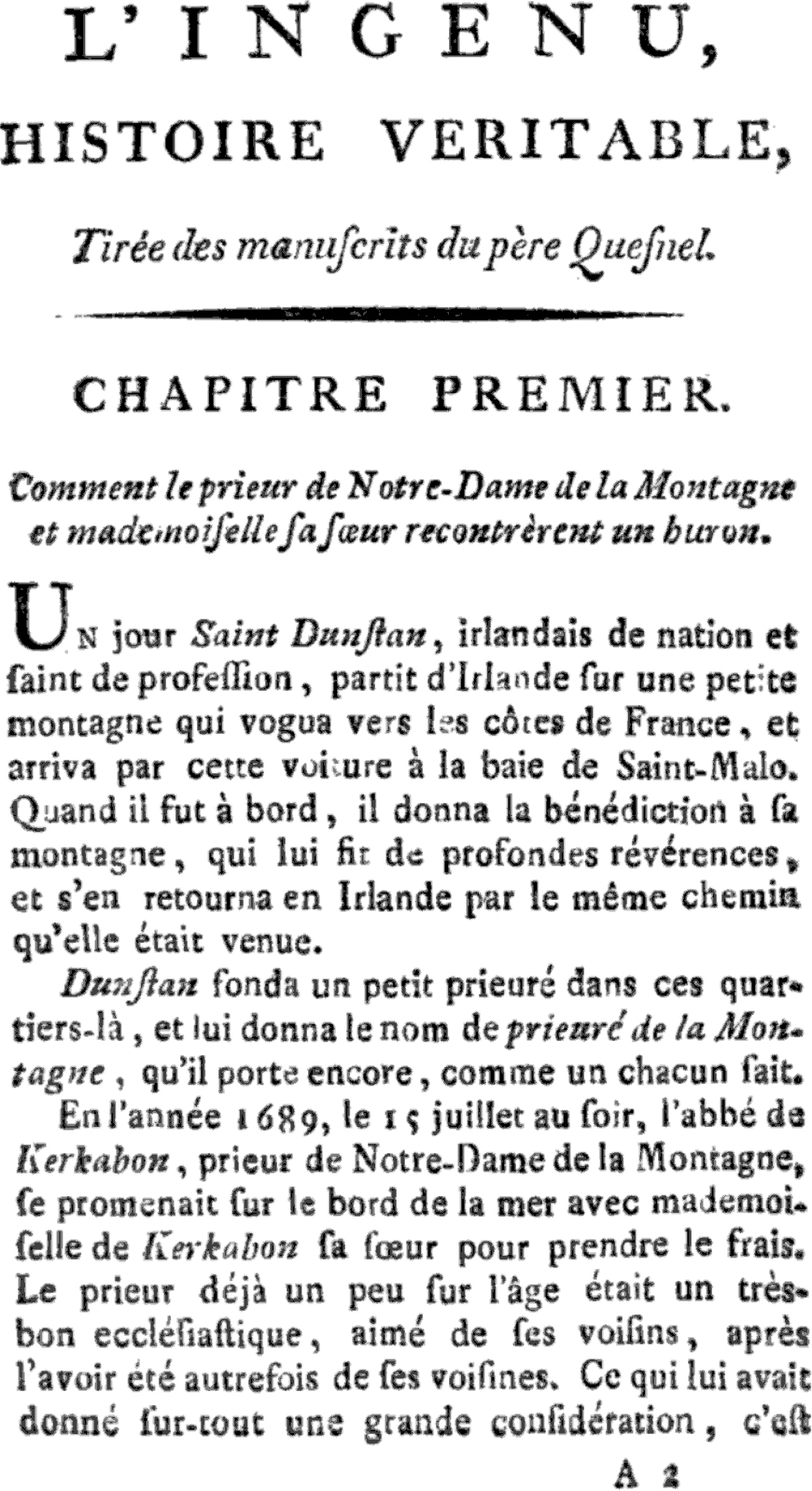- L'Ingénu
infobox Book |
name = L'Ingénu
title_orig = L'Ingénu
translator =

image_caption =
author =Voltaire
illustrator =
cover_artist =
country =France
language = French
series =
genre =Novel conte philosophique
publisher =
pub_date = 1767
english_pub_date =
media_type = Print ()
pages =
isbn = ISBN
preceded_by =
followed_by ="L'Ingénu" is a satirical novella by the French writer
Voltaire , published in 1767. L'Ingénu is a mix of genres, it shares characteristics with theconte philosophique , theapologue and the novel. [L'Ingénu Voltaire, Profil d'une oeuvre, page 2, 1989] It tells the story of aHuron Indian transported to the sophistication of eighteenth centuryParis , and satirizes religious doctrine, as well as the folly and injustices of French society.The Story
In 1689, L'Ingénu, a
Huron , comes toBrittany to discoverFrance . Once there M. Kerkabon (a Breton) and his sister recognize him as their cousin, because they realize he is the son of their brother who died in Canada. He is quickly integrated into the local society and baptized so that he can become a Christian. L'Ingénu's solid common sense makes that a very difficult task; he wishes to apply the the Bible word for word and doesn't understand why they don't let him marry Mlle de Saint-Yves simply because she is his godmother. Afterwards he fights a British invasion and wants to free Saint-Yves who is locked up in a convent.Deterred from doing that he goes to Versailles to demand a reward for his bravery towards the British invasion and to ask for Saint-Yves' hand in marriage. On the way he encounters protestants who expose him to the problems they face due to religious intolerance and promises to speak about this to Louis XIV. ABrittany representative who wanted his son to marry Saint-Yves, he is also aJesuit spy and turns him in to the minister of War. L'Ingénu is then locked up in theBastille with Gordon aJansenist who becomes his friend. Gordon completes L'Ingénus education with many lectures, and books.Meanwhile, the Kerkabons and Mme Saint-Yves (who escaped from her convent) attempt to get the King to spare L'Ingénu. Mme Saint-Yves accomplishes this only by giving herself to Mr. Saint-Pouange. Freed along with Gordon the Huron meets Saint-Yves. Tormented by remorse for having betrayed L'Ingénu, Mme Saint-Yves dies with L'Ingénu's pardon. A great military and philosophical career will never let L'Ingénu forget this loss.A Satire
The book was written in 1767 but the story takes place in 1690. Voltaire criticizes events that occurred nearly a century before, but he is criticizing events that had an impact on the way things were in his time. This was supposed to help avoid censure but the police obviously understood that the book was not just criticizing past events because the book was made illegal in France shortly after it's release. Because of the prompt move by the police to censure the book L'Ingénu, the latter must have seriously criticized France and monarchy.
Religious Satire
All throughout L'Ingénu Voltaire advocates
deism notatheism , Voltaire believes in a God and a religion without churches, or policies, where only moral behavior counts. He criticizes sects, intolerance, fanaticism, superstitions, and the catholic clergy.Social and Political Satire
Voltaire, makes fun of French society using his famous irony. The main targets are : the French administration (chapted VIII is an excellent example), the justice system, the lack of freedom in France and the corruption.
References
* Frye, Northrop (1957), "Anatomy of Criticism", Princeton University Press.
* Pagden, Anthony (1983), "The Savage Critic: Some European Images of the Primitive" in "The Yearbook of English Studies", Vol.13, pp.32-45.
Wikimedia Foundation. 2010.
